This post may contain affiliate links. Please read our disclosure policy.
Paleo coconut flour pancakes that are light and fluffy, and made with just a few basic ingredients. A quick and easy, low carb gluten free breakfast!

Making pancakes with coconut flour (and is it low carb?)
Have you tried baking with coconut flour? It's very different than any other alternative gluten free flour, in behavior, taste, nutritional profile, you name it.
Coconut flour is extraordinarily absorbent, but it doesn't just need moisture. It needs structure. In short, it needs eggs! And since coconut flour absorbs so much moisture, a little goes a long, long way. That's a good thing, since it's not cheap.
I have used Let's Do Organics brand (affiliate link, feel free to shop around!), Nuts.com brand and Trader Joe's coconut flour, all with good results. If you're wondering about the nutrition in coconut flour, I was too so I looked it up and it's very encouraging!
Coconut flour is very high in fiber, but it actually has more net carbs (carbs minus fiber) than almond flour. Generally, coconut flour and almond flour are great partners in Paleo baking, as they balance each other quite well in recipes. In this recipe, though, I lightened up the coconut flour with tapioca starch.
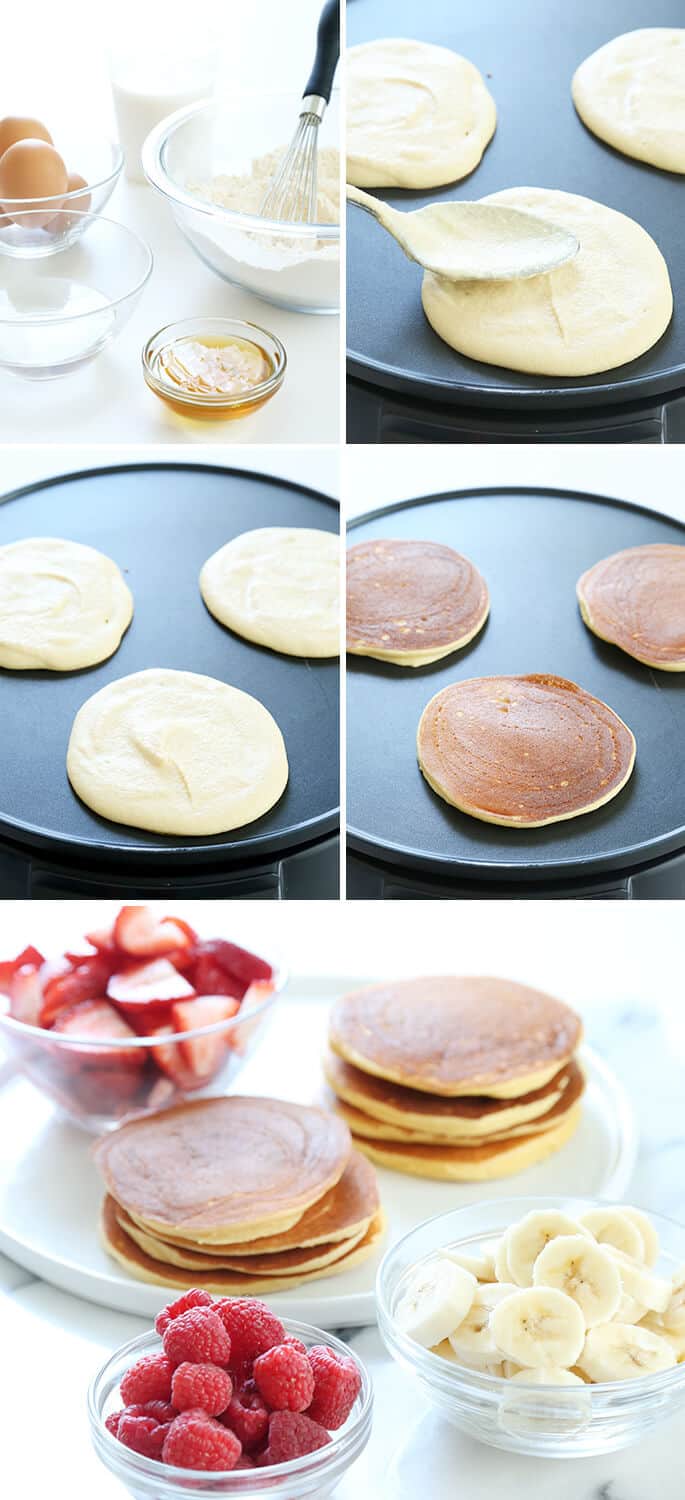
Avoiding the “egg trap” in making coconut flour pancakes
The main challenge in making a recipe like these coconut flour pancakes is to use enough eggs to be successful, but balance the recipe to prevent the pancakes from tasting like, well, an omelet. I love omelets, but only they should taste like that.
I've tried the 2-ingredient banana pancakes (just bananas and eggs!) and the 2-ingredient cream cheese pancakes (just cream cheese and eggs!) and despite my best efforts and positive pancake thoughts, they each taste … like an omelet.
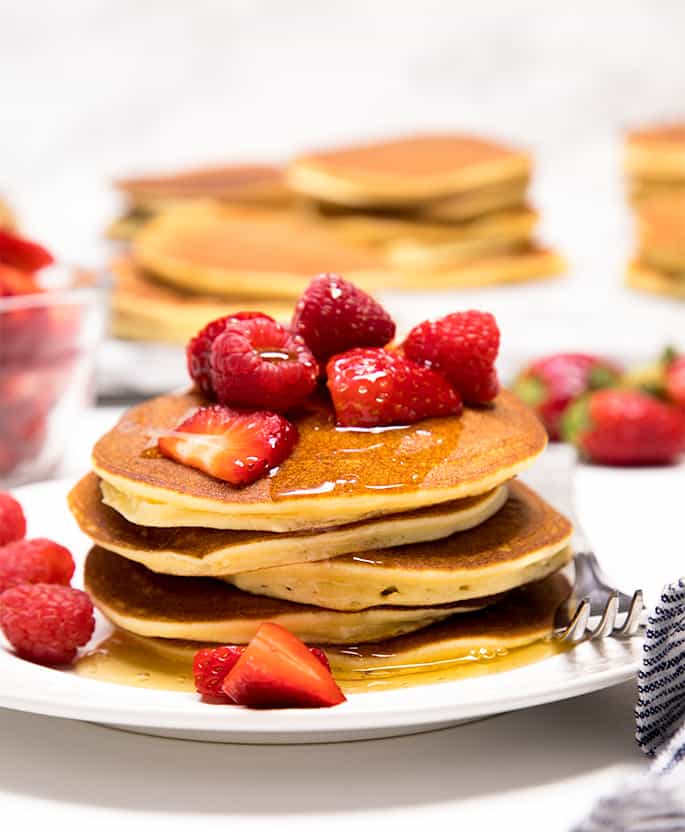
Can you make this coconut flour pancake recipe without any starch?
No, you must use some starch for fluffy coconut flour pancakes. I tried and tried to make this recipe with only coconut flour, and no starch.
Not only could I not get much fluff for all my troubles, but I needed another egg to avoid a dry pancake that had to be eaten immediately after it came off the skillet.
Plus the whole business came dangerously close to tasting like omelet-y. Coconut flour does tend to clump. Making the batter in a blender or food processor makes a very big difference in a smooth batter that can be poured and then quickly spread into a round pancake.
If you can have nuts, you should try my almond flour Paleo pancakes. They have a lovely, buttery flavor (of course, without any actual butter) because of the almond flour, and a bit of tapioca flour gives them great texture and helps hold them together beautifully.
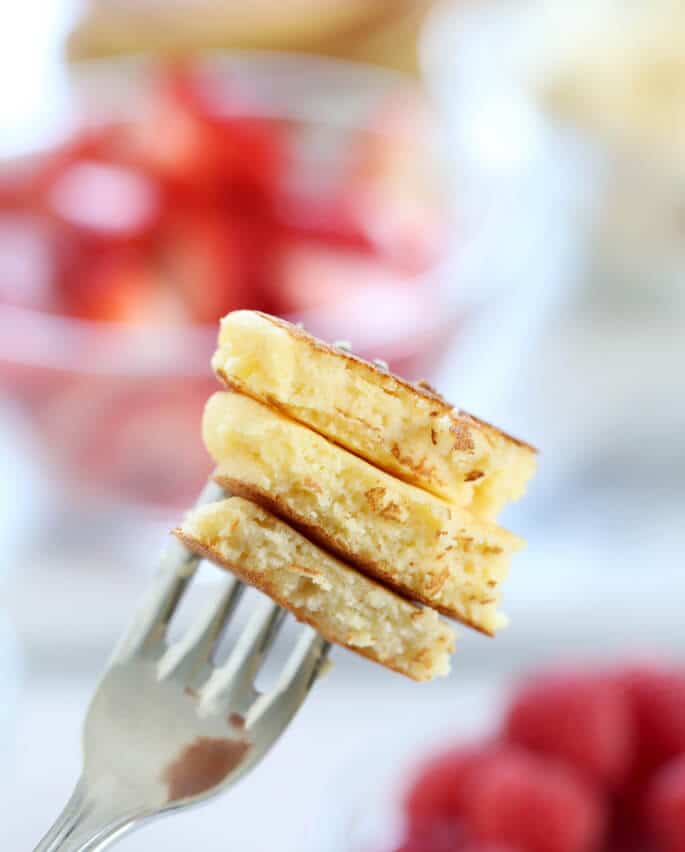
These coconut flour pancakes do, indeed, taste smell faintly of coconut. Since that's a pleasing flavor to most, it shouldn't be an issue. If you are relatively neutral about the taste of coconut, even, you will most likely enjoy these pancakes.
Substitutions for ingredients in these coconut flour pancakes
Coconut flour
If you just can't stand coconut, well then this isn't the recipe for you. If you're looking for another similar, lower carb recipe for pancakes, try my Paleo pancakes, which are made with almond flour. Or perhaps a classic gluten free pancakes or gluten free waffles recipe made with a rice flour-based all purpose gf flour blend would suit your needs better.
Can you make coconut flour pancakes without coconut oil?
Yes. If you can have butter and you'd like to replace the coconut oil, I'd try using unsalted butter, by weight, in its place. Nonhydrogenated vegetable shortening, like Spectrum brand, should work as well.
What sort of milk is best for these coconut flour pancakes?
I've made these pancakes using light coconut milk (not the thick, canned kind, which is too thick), unsweetened almond milk, and even (*gasp*) whole dairy milk. The results have been largely the same.
Can you replace the honey in this recipe?
Yes. Typically, a liquid sweetener can be replaced with another liquid sweetener of a similar thickness.
So honey and maple syrup aren't generally great substitutes for one another. But if you can find a thick agave syrup, and you're comfortable using that, I'd give it a try in this recipe.
Can you make coconut flour pancakes without eggs?
I'm afraid I'm not optimistic that the 4 eggs in this recipe could be replaced effectively with any sort of egg replacer. A “flax egg” or a “chia egg” generally works best when replacing 2 eggs or fewer in a recipe.
If you'd like to try replacing the eggs, I'd actually try using two “chia eggs” and 1/2 cup of smooth applesauce in place of the 4 eggs. No promises, though! You'll have to experiment.
Can you replace the tapioca flour in these coconut flour pancakes?
Maybe! Tapioca flour is a unique starch, as it provides elasticity as well as lightness.
It doesn't have a true equal, but in this recipe arrowroot starch works quite well. Be sure to replace it by weight, not by volume, though.
Fluffy Coconut Flour Pancakes Recipe
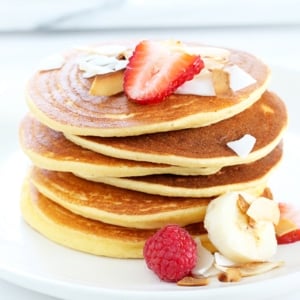
Ingredients
- 1 cup (8 fluid ounces) unsweetened nondairy milk , (I like unsweetened almond or coconut milk, but not from a can, which is too thick), at room temperature
- 4 tablespoons (56 g) virgin coconut oil, melted and cooled (plus more for greasing the pan)
- 4 (200 g (weighed out of shell)) eggs, at room temperature
- 2 tablespoons (42 g) honey
- 10 tablespoons (80 g) coconut flour
- ½ cup (72 g) tapioca starch/flour
- ⅛ teaspoon kosher salt
- 2 teaspoons Paleo baking powder, 1 teaspoon cream of tartar + 1/2 teaspoon baking soda + 1/2 teaspoon tapioca flour or arrowroot
Instructions
- In a blender or food processor fitted with the steel blade, place the milk, melted coconut oil, eggs and honey, and pulse to combine.
- In a separate, small bowl, place the coconut flour, tapioca flour, salt and baking powder, and whisk to combine well.
- Add the dry ingredients to the wet ingredients in 2 batches, pulsing to combine after each addition.Once all the dry ingredients have been added, blend or process until very smooth.
- Allow the batter to sit for about 2 minutes (it will thicken and begin to appear a bit clumpy), and then blend or process again until smooth. The batter will be thick.
- Heat a griddle or lightly greased nonstick or cast iron skillet over medium-low heat. Pour about 2 tablespoons of batter onto the hot griddle and, using the underside of a large spoon and working quickly before the pancake begins to set, spread the batter into about a 4-inch round, just less than 1/4-inch thick.
- Repeat with as many pancakes as can fit comfortably at one time, without touching, on the skillet.
- Allow the pancakes to cook for less than 2 minutes, or until the underside is evenly browned. Not many bubbles will break through the surface during cooking as they would with conventional pancakes.
- With a wide, flat spatula, carefully flip over each pancake, and continue to cook until set on the underside (about another 45 seconds). Remove from the skillet, and repeat with the remaining batter.
- Pancakes can be cooled completely, then stacked, wrapped tightly and frozen. Separate the pancakes and defrost in the toaster oven on ‘light’ or ‘low.’
- This recipe can easily be halved or even divided by 4, to make coconut flour pancakes for one.
Video
Notes
Nutrition
Nutrition information is automatically calculated, so should only be used as an approximation.
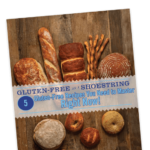
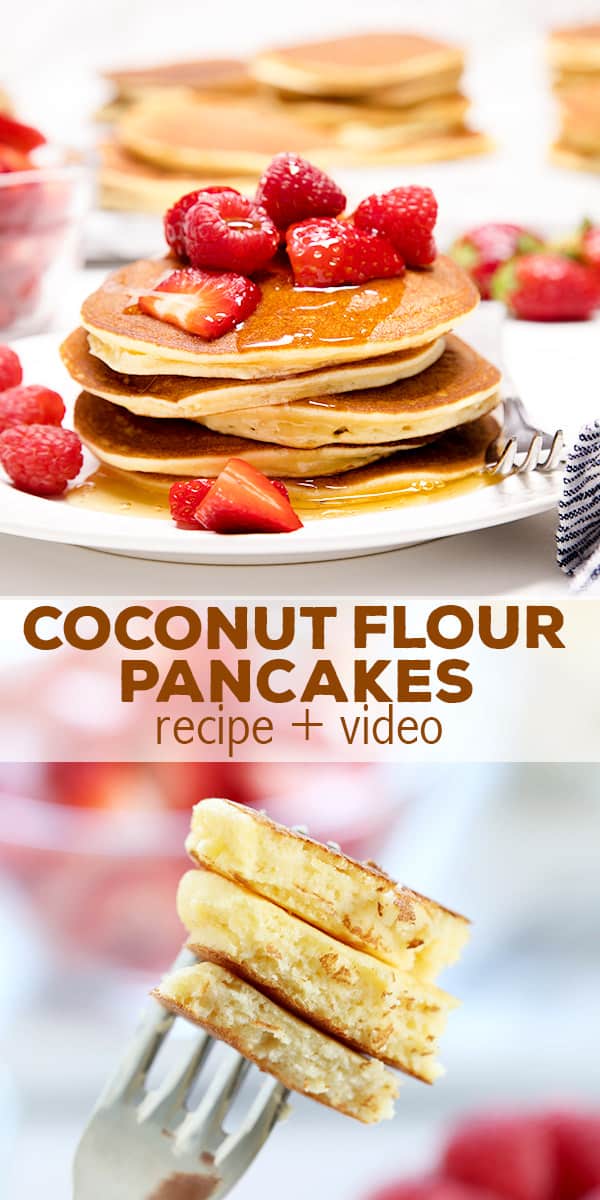
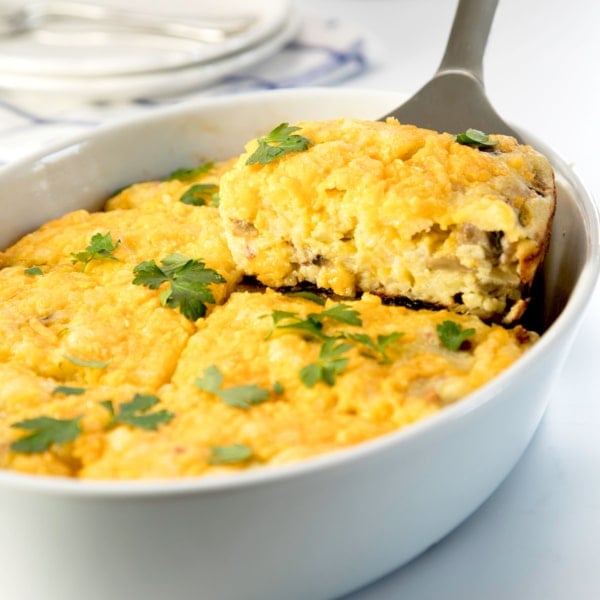
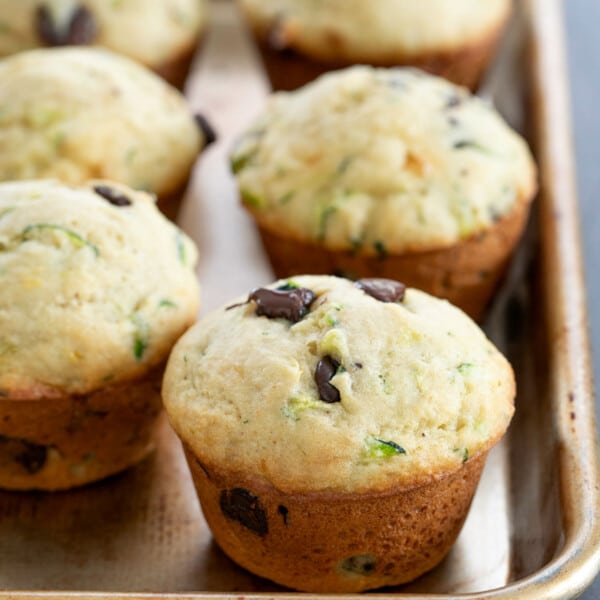

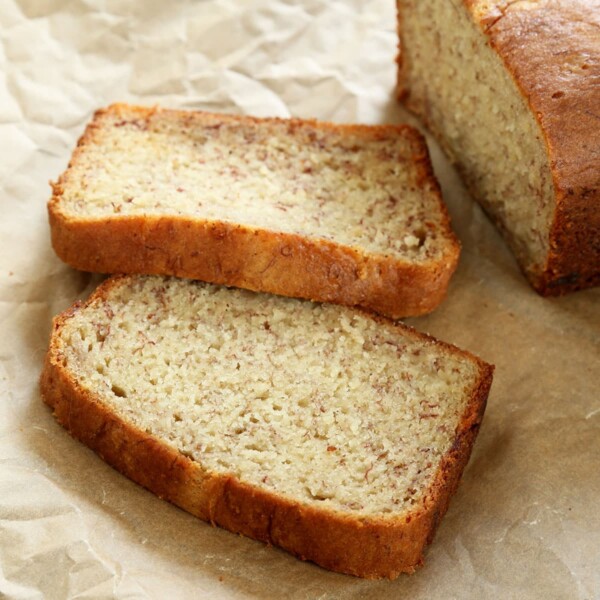









Is the baking powder an option compared to the cream of tartar/baking soda/tapioca or arrowroot? I ask because the second set of ingredients is in a different font. Also, in the directions it does not say to add cream of tartar/baking soda/tapioca or arrowroot. Do I add all of these in the part of the directions where it says to add the baking powder?
Hi, Barbara, yes you can definitely use regular baking powder, which is made with starch and is not technically “Paleo” legal. Those amounts are to make your own Paleo baking powder.
What capacity is the blender cup that you used?
Hi, Jeana,
I believe it’s a 4.5-cup (U.S.) blender.
Oh, I want to make this! I already have all the ingredients and I love simple recipes!
could i just pour mixture into a cookie sheet and bake it all at once? advice on temp and time?
I’m afraid the answer is definitely, not! This recipe is made as pancakes, only.
These were great! A little finicky in the blender, trying to get the last bit of batter out, but nonetheless. I used coconut almond milk, added cinnamon to the batter, and dropped mini chocolate chips onto the pancakes as they were cooking. Much easier to work with than some other coconut flour pancakes I’ve tried.
That is definitely one frustrating thing about making batter in a blender, Karla. The NutriBullet blend that I use in the video makes that a bit easier. Or you could always use a food processor. Glad you enjoyed the pancakes!
Thank you SO MUCH, Nicole!
…just got your email about it, and it says “Click for the easy recipe + VIDEO!”
So? I was really excited to watch, learn & share HOW you’re making it?
But??…can’t find the video anywhere???
WHERE IS THE VIDEO?!?!?
Just scroll down, Kyoko! It’s right above the recipe itself. And I refer to that in the second line of the post: “(I’ve added a how-to video to this page, so you can look over my shoulder while I make these beautiful, truly healthy pancakes. Scroll down! It’s right above the recipe itself.)”
Thank you for your kind & speedy response, Nichole! :-)
However?…I looked & even refreshed this page over & over again?…but between your lines: “…Click on the ▶︎ play button below and you can watch my very hands make the batter, and cook the pancakes…” and “…Prep time: 5 minutes Cook time: >15 minutes Yield: 10 to 12 pancakes…”, there’s a BIG BLANK SPACE with the same back-ground-color there??…but NO VIDEOS?!?!? ;_) ;_) ;_)…
Will you please give me a link to watch it??? THANK YOU SOO VERY MUCH AGAIN, NICHOLE!! ? ^ – ^
I’m afraid I don’t understand, Kyoko. The video is there, right above the recipe. Maybe try clearing your browser’s cache and trying again?
I just made these–I didn’t have tapioca so I used the arrowroot. It’s amazing! And I’ve been trying so many different recipes for that “perfect pancake”. I’ve finally found it. Now I just have to change the measurements for one (newby on measurements). :)
Hey-can we make waffles with this recipe???
I haven’t tried making waffles with it, Penny. Generally, waffles are made with eggs that have been separated and the whites whipped to stiff peaks and then folded into the batter. That would be a challenge with this batter, I’m afraid.
Can I seperate the eggs and whip the eggs whites till they stand on their own and then fold them into the batter? That is what I do to regular pancakes and it makes them extra fluffy. I do that to my almond flour pancakes and they are almost like regular pancakes.
As always with any recipe, Mabel, I recommend making it as written before altering the recipe at all. After that, feel free to experiment!
I just tried this recipe today–I had saved it on a Pinterest board. Delicious! I am taking some to work tomorrow (I start at 7am so I bring my breakfast). Thanks, Nicole!